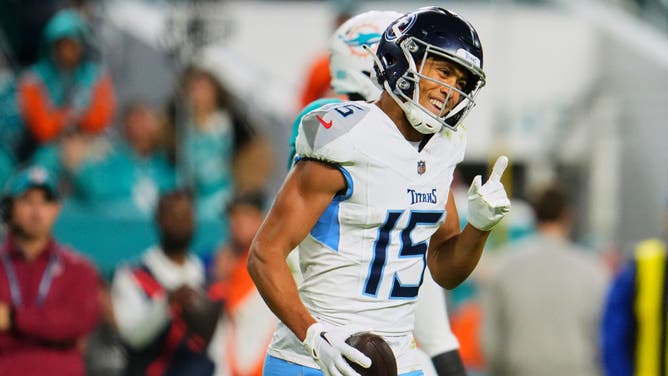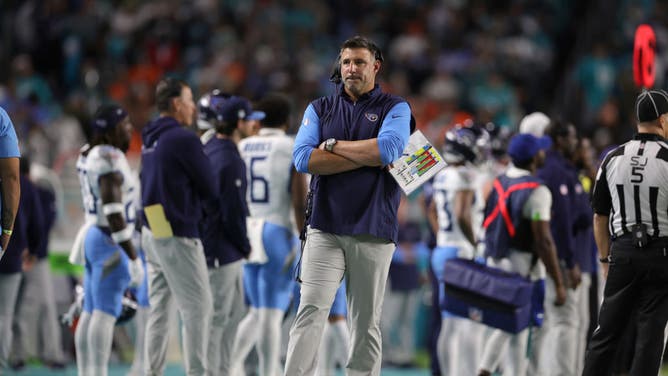Titans Coach Mike Vrabel Used Analytics To Beat Dolphins And It Was Glorious | Dan Zaksheske
As a Miami Dolphins fan, watching the Tennessee Titans score 15 points in the final three minutes to beat Miami hurt badly. As a defender of analytics in the NFL, watching head coach Mike Vrabel perfectly execute the "down eight, go for two" strategy warmed my heart.
Analytics gets a bad rap, mostly because the majority of NFL media simply doesn't understand. They think it means "go for every fourth down" or "never punt" or "go for two more often."
Sometimes analytics leads to those decisions, but that's not the focus. The best way to describe analytics is thusly: make the most statistically-optimal decision every time.

Tennessee Titans head coach Mike Vrabel perfectly applied analytics in his team's Monday Night Football win over the Miami Dolphins. (Photo by Rich Storry/Getty Images)
Think of it like a game of blackjack. There is a chart that shows exactly what you should do in every situation. This gives you the best chance to win over the long-term. It doesn't mean you're going to win every hand.
Sometimes, you might take a hit on a 14 with the dealer showing a six. That's a bad decision. However, occasionally the dealer gives you a seven and you hit 21. Was it the right decision? No, it wasn't. But, it worked out.
The percentages aren't 100% or 0%.
Conversely, sometimes you stand on that 14 and the dealer flips over an eight for 14 and then hits a seven to make 21. You lose. Was it the wrong play? No, it wasn't. You made the best decision at the time with the available information.
Now, imagine millions people are watching you play blackjack. All of them think that you should hit on that 14. You stand. The dealer makes a hand and beats you. Everyone now blames your decision for the loss.
Would that change the way you played the hand? Probably. That's exactly why many coaches don't make the optimal move. Even though it gives them the best chance, especially over the long-term, they don't want to face the criticism.
In that same example, if you take the hit that everyone wants you to take and you bust, no one blames you. They think you made the right call and it just didn't work out.
Mike Vrabel correctly using analytics allowed the Titans to beat the Dolphins on Monday Night Football
In Monday night's stunning upset win over the Miami Dolphins, Tennessee Titans head coach Mike Vrabel elected to go for a two-point conversion with his team trailing by eight points. This is the statistically-optimal decision.
The Titans got the two, scored another touchdown, kicked the extra point and won the game.

Nick Westbrook-Ikhine of the Tennessee Titans celebrates after a two-point conversion against the Miami Dolphins. (Photo by Cooper Neill/Getty Images)
For those who don't understand why that's the right decision, here's the breakdown.
Let's assume that teams have a 50% chance to convert a two-point conversion (that's on the low end, the NFL average is actually about 55%, but let's keep the math simple).
Thus, teams have a 50% of converting the first two-point play and setting themselves up to win the game with another touchdown.
If they don't convert, though, they still have another opportunity on the second touchdown to convert and tie the game.
Additionally, let's assume that each team has a 50% chance to win if the game goes to overtime.
So, here are the four possible scenarios and the odds they happen (again, simplified math for the sake of illustration).
Add them up. Teams have a 62.5% chance of winning, 37.5% of losing.
On the flip side, if teams simply kick the two extra points, then the game goes to overtime where each team has a 50% chance of winning.
Personally, I'm taking the extra 12.5% chance, thank you very much.
Yes, there's more to football than mere percentages, but the choice is still clear
Of course, it's not that simple. This is a game played by humans and other factors might go into a decision. But, that comes into play more in the fourth-down decisions than it does the "go for two" decision.
The point is that it's great to see coaches employ these tactics more and more on a global scale. Something that was completely taboo 10 years ago now appears to have hit the mainstream.
That's a good thing for the NFL, not a bad thing.

Tennessee Titans head coach Mike Vrabel perfectly applied analytics in his team's Monday Night Football win over the Miami Dolphins. (Photo by Megan Briggs/Getty Images)
The unfortunate part is that the decision made by Mike Vrabel isn't getting the publicity it deserves. Even then, many people label it as an "gutsy decision" or a "risky call." Truth is, it wasn't an aggressive or risky decision. It was the conservative choice.
He made the selected the alternative that gave him the best chance to win. The "risky" decision would be to take the two extra point kicks and tie the game, taking his chances in overtime.
The only thing that made his decision "risky" is the fact that people would have criticized him if it didn't work out.
It's more obvious in the blackjack example from before. The "risky decision" is to take that hit on 14. Most people understand that concept.
Unfortunately, people don't apply the same logic to football.